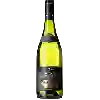
Winery Guilbaud FrèresDomaine de la Moutonnière Muscadet Sèvre et Maine Sur Lie
This wine generally goes well with
Wine flavors and olphactive analysis
On the nose the Domaine de la Moutonnière Muscadet Sèvre et Maine Sur Lie of Winery Guilbaud Frères in the region of Loire Valley often reveals types of flavors of tree fruit, citrus fruit.
Details and technical informations about Winery Guilbaud Frères's Domaine de la Moutonnière Muscadet Sèvre et Maine Sur Lie.
Discover the grape variety: Melon
Melon blanc is a grape variety that originated in France (Burgundy). It produces a variety of grape specially used for wine making. It is rare to find this grape to eat on our tables. This variety of grape is characterized by small to medium sized bunches and small grapes. Melon blanc can be found in several vineyards: South West, Cognac, Bordeaux, Loire Valley, Burgundy, Beaujolais, Provence & Corsica, Rhone Valley, Savoie & Bugey, Languedoc & Roussillon.
Last vintages of this wine
The best vintages of Domaine de la Moutonnière Muscadet Sèvre et Maine Sur Lie from Winery Guilbaud Frères are 2016
Informations about the Winery Guilbaud Frères
The Winery Guilbaud Frères is one of of the world's greatest estates. It offers 39 wines for sale in the of Muscadet-Sevre et Maine to come and discover on site or to buy online.
The wine region of Muscadet-Sevre et Maine
The wine region of Muscadet-Sevre et Maine is located in the region of Muscadet of Muscadet of France. Wineries and vineyards like the Domaine de l'Ecu or the Domaine de Bellevue produce mainly wines white and red. The most planted grape varieties in the region of Muscadet-Sevre et Maine are Melon, Muscadelle and Folle blanche, they are then used in wines in blends or as a single variety. On the nose of Muscadet-Sevre et Maine often reveals types of flavors of cream, asparagus or baked apple and sometimes also flavors of honeydew melon, hay or citrus zest.
The wine region of Loire Valley
The Loire Valley is a key wine region in western France. It follows the course of the Loire River on its Long journey through the heart of France, from the inland hills of the Auvergne to the plains of the French Atlantic coast near Nantes (Muscadet country). Important in terms of quantity and quality, the region produces large quantities (about 4 million h/l each year) of everyday wines, as well as some of France's greatest wines. Diversity is another of the region's major assets; the styles of wine produced here range from the light, tangy Muscadet to the Sweet, honeyed Bonnezeaux, the Sparkling whites of Vouvray and the juicy, Tannic reds of Chinon and Saumur.
The word of the wine: Structure
Refers to both the structure and the overall constitution of a wine.














